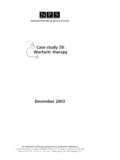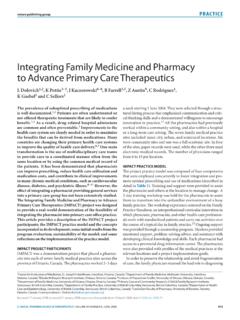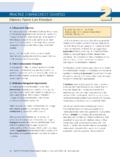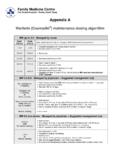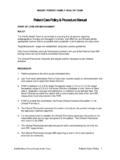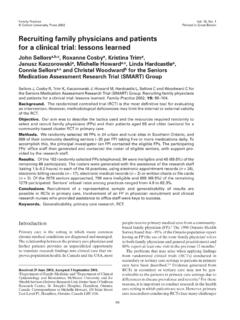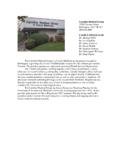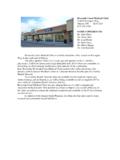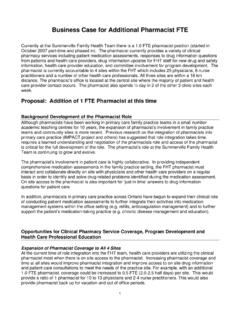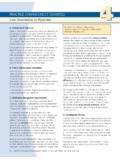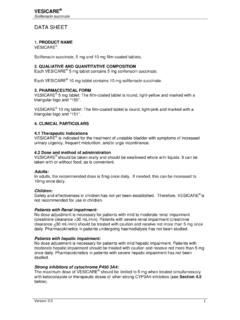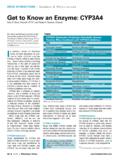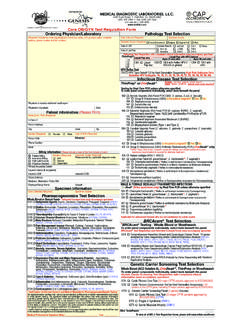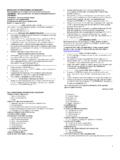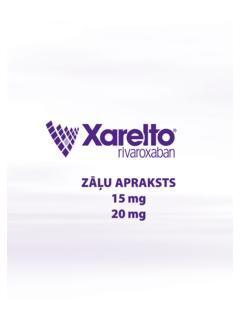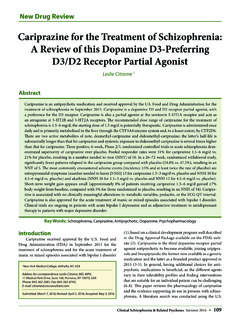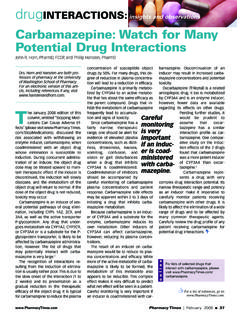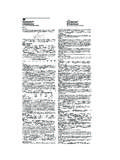Transcription of What You Should Know About Your Diet and Warfarin
1 What You Should know About your diet and Warfarin What is Warfarin ? Warfarin is a medication that helps thin your blood to decrease your body's chance of forming harmful clots. Unwanted blood clots may cause strokes, heart attacks, or other potentially harmful events such as clots in the legs (deep vein thrombosis) or lungs (pulmonary embolism). How does Warfarin work? There are proteins in your blood to help form clots. These proteins are made by your liver with the help of vitamin K. Warfarin works by blocking the effects of vitamin K, making it harder for your body to form clots. In order to make sure the amount of Warfarin you're taking is right for you, your healthcare professional will test your blood periodically. The blood test checks your protime (PT) or international normalized ratio (INR) to measure how long it takes for your blood to clot.
2 If your PT/INR is outside your target range, your Warfarin dose will need to be adjusted. How does your diet affect Warfarin ? Since vitamin K and Warfarin work against each other, the amount of vitamin K in your diet can change Warfarin 's effects. It is important to keep your dietary intake of vitamin K consistent. Foods such as green leafy vegetables and certain oils have higher contents of vitamin K. (See the next page for a chart of vitamin K content in selected foods). If you DECREASE your intake of vitamin K (eat fewer foods containing vitamin K) your dose of Warfarin may need to be lowered to prevent bleeding. If you INCREASE your intake of vitamin K, your dose of Warfarin may need to be increased to prevent blood clots. A MAJOR. change in your vitamin K intake can affect your PT/INR, but normal daily variation in the foods you eat is okay.
3 You DON'T have to avoid foods that are high in vitamin K, just keep your diet consistent. You Should let your healthcare professional know if there is going to be a major change in your diet , so your PT/INR can be closely monitored. Many people are on special diets, such as the Atkin's or South Beach diets, to lose weight. These diets are high protein diets and can also affect the way Warfarin works in your body. Once you take a dose of Warfarin , some of it binds to protein in your bloodstream. While Warfarin is attached to this protein, it has no effect on your body. It's thought that high protein diets can increase the amount of proteins in your body and cause more Warfarin to be bound to protein. This causes a DECREASE in Warfarin available to prevent clots, so your Warfarin dose may need to be increased.
4 Always check with your healthcare professional before starting any special diets, so your PT/INR can be closely monitored. Certain foods can also affect how your liver clears Warfarin from your body, causing Warfarin levels to increase or decrease. Examples include alcohol, cranberry products ( , juice, supplements), and possibly grapefruit or grapefruit juice. Too much alcohol, cranberry products, or grapefruit products can INCREASE Warfarin 's effect and increase your risk of bleeding. Avoid or limit your intake of alcohol, cranberry products, and grapefruit or grapefruit juice. Make sure your healthcare professional knows if your diet contains any of these products, so your PT/INR can be closely monitored. Other things to remember when taking Warfarin In addition to foods, many prescription and over-the-counter drugs, including vitamins and herbal supplements, can affect your Warfarin level.
5 You Should not start, stop, or change doses of any drugs or supplements without first talking with your healthcare professional. Try to keep a healthy, well-balanced diet and keep your vitamin K intake consistent. Take your Warfarin dose around the same time each day. If you miss a dose, take it as soon as you remember. If it is almost time for the next dose, skip the missed dose and continue your regular dosing schedule. Don't double up doses without checking with your healthcare professional. Tell your healthcare professional immediately if you have unusual bleeding or bruising, black or bloody stools, blood in the urine, or stomach pain.. Prepared for the subscribers of Pharmacist's Letter / Prescriber's Letter to give to their patients. Box 8190, Stockton, CA 95208.
6 Phone: 209-472-2240 ~ Fax: 209-472-2249. ~ Vitamin K Content of Selected Foods*. Note: This is NOT a list of foods to avoid. This list provides information on the vitamin K. content of certain foods. Vitamin K Content Foods Low Moderate High Vegetables Green beans Asparagus Broccoli Carrots Avocado Brussels sprouts Cauliflower Red Cabbage Cabbage Celery Green peas Collard greens Corn Endive (raw). Cucumber (peel removed) Pickle (dill) Kale (raw leaf). Eggplant Lettuce (iceberg) Lettuce (bib, red leaf). Mushrooms Mustard greens (raw). Onions Parsley Green pepper Spinach Potato Turnip greens (raw). Pumpkin Watercress (raw). Sauerkraut (canned) Swiss chard Tomato Fruits Apple Banana Blueberries Grapes Orange Meats Beef Chicken Pork Tuna Turkey Fats and Oils Corn oil Margarine Mayonnaise Peanut oil Olive oil Canola oil Safflower oil Soybean oil Sesame oil Sunflower oil Dairy Products Butter Cheese (cheddar).
7 Eggs Sour cream Yogurt Beverages Coffee Cola Fruit juices Milk Tea (black) Tea (green)**. * Adapted with permission from Clotcare Online Resource at (Accessed April 20, 2005). ** There is some controversy as to whether brewing green tea alters the vitamin K content and/or whether green tea may alter the effect of Warfarin by some other mechanism.. Prepared for the subscribers of Pharmacist's Letter / Prescriber's Letter to give to their patients. Box 8190, Stockton, CA 95208. Phone: 209-472-2240 ~ Fax: 209-472-2249. ~ (Page 3 of 8).. Detail-Document #210507. This Detail-Document accompanies the related article published in .. PHARMACIST'S LETTER / PRESCRIBER'S LETTER. May 2005 ~ Volume 21 ~ Number 210507. Warfarin -Food Interactions Lead author: Wan-Chih Tom, Background diets have an induction phase, where patients are The interaction between Warfarin and vitamin to eliminate almost all carbohydrates from their K-containing foods is well documented.
8 Patients diet for at least two ,4 Anticoagulation on Warfarin therapy are instructed to report any clinicians are seeing more INR fluctuations in significant changes in their dietary vitamin K patients who are on high-protein, low- intake in order to maintain a therapeutic carbohydrate diets. There are two case reports of international normalized ratio (INR). However, decreased INR after initiation of high-protein, possible interactions between Warfarin and high low-carbohydrate diets, requiring Warfarin dosage protein diets, foods with antiplatelet effects, or to be increased by 20% to 30% to achieve foods that affect the cytochrome P450 enzyme therapeutic system are not as well documented. Warfarin is a medication that is highly protein Warfarin is a racemic mixture of R- Warfarin The decreased INR in patients following and S- Warfarin Warfarin is initiation of a high-protein, low-carbohydrate diet predominately metabolized by the cytochrome may be related to the effect of protein intake on P450 enzyme The two Warfarin albumin An increase in albumin level enantiomers have different therapeutic potency appears to occur within ten days of initiating a and are metabolized by different CYP450 high-protein, low-carbohydrate The increase isoenzymes.
9 S- Warfarin is the most potent of the in albumin level causes an increase in Warfarin two ,2 S- Warfarin is primarily a binding to albumin, making less free Warfarin substrate for CYP2C9 and secondarily available for anticoagulant Some experts R- Warfarin is primarily a substrate for CYP1A2, suggest that a high-protein, low-carbohydrate diet secondarily CYP3A4, and slightly may also have an affect on Warfarin 's metabolism Foods that induce these isoenzymes can decrease via the cytochrome P450 system. Warfarin effect and foods that inhibit these Because of the potentially significant decrease isoenzymes can potentiate Warfarin The in INR level, patients are at high risk of significance of the interaction will depend on developing thromboembolism shortly after which isoenzyme(s) the food affects and how starting the diet .
10 Advise patients to consult their much of the implicated food is consumed. anticoagulation clinician prior to starting a high- Theoretically, foods such as cranberry juice, protein, low-carbohydrate diet in order to ensure grapefruit juice, mango fruit, charbroiled foods, close monitoring of INR level [Evidence level D;. alcohol, and caffeine can affect Warfarin Anecdotal evidence].5. metabolism via the CYP450 enzyme system and potentially alter Warfarin effects. Cranberry Juice In 2003, the England-based Committee on High Protein Diets Safety of Medicine (CSM) issued a warning About In the last few years, the popularity of high the possible interaction between cranberry juice protein, low carbohydrate diets, such as the Atkins and Warfarin based on five case reports of such diet and South Beach diet has soared in the The potential interaction is Patients get on these diets in hopes of shedding suspected to be due to flavonoids found in extra pounds.
